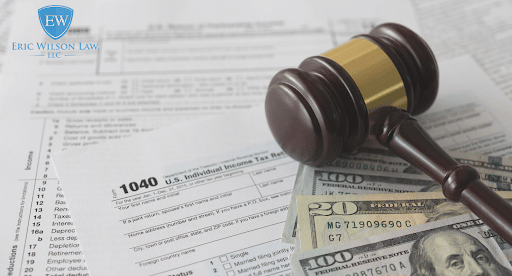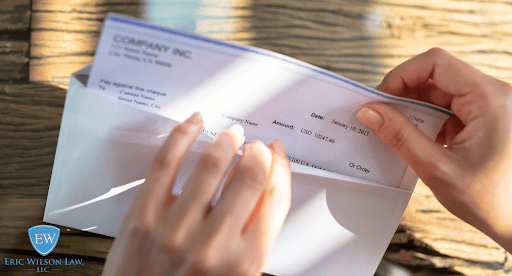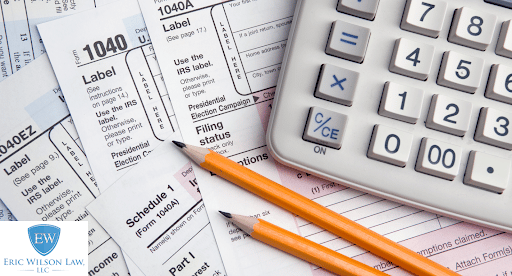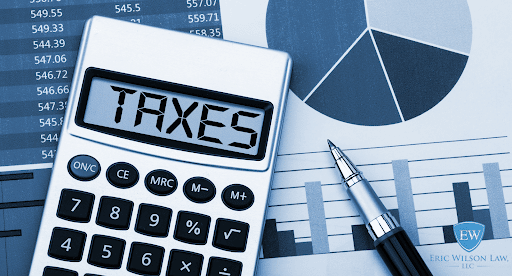IRS Wage Garnishment
There’s an old saying that highlights the two guarantees in life: death and taxes. Luckily, the world is not quite that bleak. But not paying your taxes can be a serious issue. If you fail to pay taxes, the Internal Revenue Service (IRS) can take matters into its own hands and issue a tax levy against you. If you’re facing IRS wage garnishment, it may be in your best interest to contact an experienced Alabama law firm to help you through this complicated situation. Call Eric Wilson today for a free consultation on your case at 205-349-1280.

What Can the IRS Garnish?
Once the IRS determines that you have a tax liability or other unpaid federal bill, the entity will take the necessary means to remedy your tax debt or bill. The most common type of garnishment is IRS wage garnishment. However, the IRS can also take your tax return, either in part or in whole, for unpaid debts. If the previous two methods don’t satisfy your tax debt or federal bill, the IRS can also issue a federal tax lien on your personal property, such as your home or vehicle. This includes your personal bank accounts. These aren’t exempt either–the IRS can pull funds from any bank account in your name, in order to repay any federal debt or taxes owed.
What’s the Difference Between a Tax Levy and a Tax Lien?
Levies and liens both describe measures to relieve tax liability. However, the two are not the same.
The IRS can issue federal tax liens against your property if the IRS determines that you have unpaid tax debt. A tax lien is the IRS making a claim on the property if you fail to pay the tax debt. You should consider a lien as a serious warning that the IRS will take the property if the outstanding tax debt is not paid.
In contrast, a wage levy occurs when the IRS actually takes the property. Levies are much more difficult to navigate because the IRS has already seized the money or property to pay your tax debt.
What are IRS Wage Garnishments?
When you have unpaid debts, you open yourself up to IRS wage garnishment as well. Your employer will receive a notice to send a portion of your wages to the creditor. If your employer fails to do this, they can be liable for the money you owe. The IRS can issue a wage garnishment, as well as private creditor, as long as they’ve secured a court order.
What Can Cause the IRS to Garnish My Paycheck or Bank Account?
Wage garnishments due to unpaid tax debts are also called wage levies. Unpaid income tax can cause the IRS to issue a wage levy. The IRS levies (or takes) a portion of your paycheck until you pay the unpaid taxes (plus interest). The IRS can also take the money out of your bank account equal to the debt plus interest.
A few examples of why the IRS might garnish your wages include:
- Outstanding Tax Debt–If you have an outstanding tax debt, the IRS can garnish your wages, tax returns, or bank accounts until the back taxes are paid off.
- Child Support–If you have not paid child support, the IRS can garnish your wages up to 65%. If you are supporting another spouse or child, the limit can drop to 50%.
- Defaulted Loans–If you have defaulted on your federal student loans, an IRS office can issue a garnishment of up to 15% until the loan is paid off.
Legally, Can the IRS Garnish Wages?
Wage garnishment is a way for the IRS to recoup money to pay an outstanding tax debt or federal debt. The IRS has full authority under federal law to begin garnishing your wages. There are a few ways to stop the levy from going into effect, but the best prevention is paying your debts.
How Do I Know if the IRS is Going to Garnish My Wages?
Wage garnishments should not come as a surprise. The IRS is legally required to notify you of any outstanding debts and let you know when they plan to start garnishing your wages. The IRS will first determine what you owe and send you a tax bill. If you ignore the IRS notices, they will send a Final Notice of Intent to Levy more than a month before issuing the wage garnishment order to your employer. Your employer will also be provided with a copy of the wage garnishment paperwork.
How Much Can the IRS Take Each Pay Period?
Unlike private creditors who are limited to 25% (or 30 times the amount of minimum wage), IRS wage garnishments depend on your filing status, the number of dependents, and how often you get paid. The IRS cannot take your entire paycheck, but they can take a significant portion of it. If you owe alimony or child support, the garnishment can take up to 50% of your paycheck. If you are more than 12 weeks behind on your payments and don’t have a spouse or other child, the limit goes up to 65%. Only a portion of your paycheck is exempt from garnishment, and this is determined by a few different factors. For example, if you are paid biweekly, filed as head of household, and have 1 dependent, $915.38 of your paycheck will continue to go to you. If you take home $2000 every 2 weeks, the IRS can garnish $1,084.62.

Can I Stop IRS Wage Garnishment?
There are a few ways to stop or postpone IRS wage garnishment. If you have received notice of an IRS tax levy on your wages or other property, it may be in your best interest to contact a qualified Alabama tax attorney, like Eric Wilson. Someone who has experience with tax law can help guide you through the process of a tax levy and explore all the options available.
Pay Off the Debt
The simplest way to stop IRS wage garnishment is to pay off the money you owe. Unfortunately, this is not possible for many going through a financial hardship. If you owe money, there are a few ways to pay besides a lump sum payment.
Offer in Compromise
If you cannot pay all the debt at once, you can offer to pay a percentage of the debt and settle. This is called an Offer in Compromise. The IRS will assess everything–your income, property, assets, and expenses. The IRS will either accept or reject the offer.
Payment Plan
You can set up monthly payments or other payment arrangements with the IRS to settle your debt. The IRS offers both short and long-term payment options, but approval is required for this method of payment. A payment agreement is not guaranteed and will depend on the individual’s financial situation.
Prove Financial Hardship
If the wage garnishment would cause severe economic hardship, you may be eligible to have your levy released. If you can prove that you and your family would not be able to handle household and basic living expenses, this would be considered financial hardship.
Bankruptcy
If you meet the eligibility criteria, you may be able to file Chapter 7 or Chapter 13 bankruptcy to stop wage garnishment. An automatic stay will stop all types of debt collection until the bankruptcy proceeding is complete.
Do I Need A Lawyer if the IRS Issues A Levy?
Navigating tax law can be a complicated and confusing process. If you have received a Notice of Intent to Levy from the IRS, you may need the help of experienced tax professionals or a tax attorney at a trustworthy law firm. A tax professional can help you understand the details of a tax levy and may be able to help you avoid wage garnishment.

Alabama Tax Debt Relief Attorney Eric Wilson
A qualified tax attorney like Eric Wilson can help find ways to avoid wage garnishment in Alabama and other tax problems. We can also communicate with the taxing authorities on your behalf. We know tax law, so we can speak their language. Based on your financial and tax situation, we will be able to recommend the best way to get relief from your debt. Call us today at 205-349-1280 to see how we can help.
Practice Areas
Office Location
Eric M. Wilson, LLC
1902 8th St Tuscaloosa, AL 35401
205-708-2115
Tuscaloosa Law Office Map and Directions

